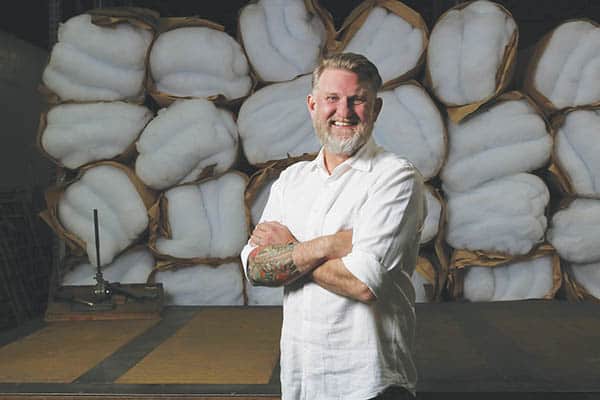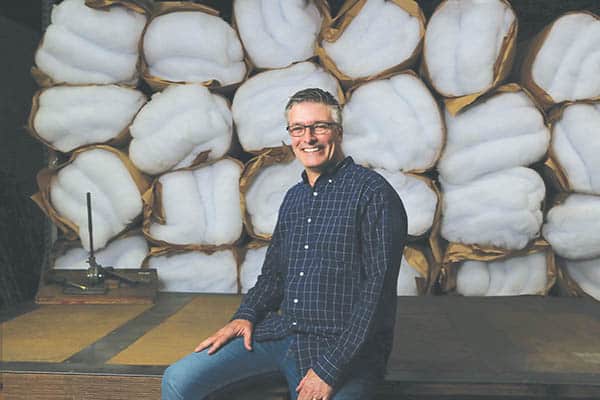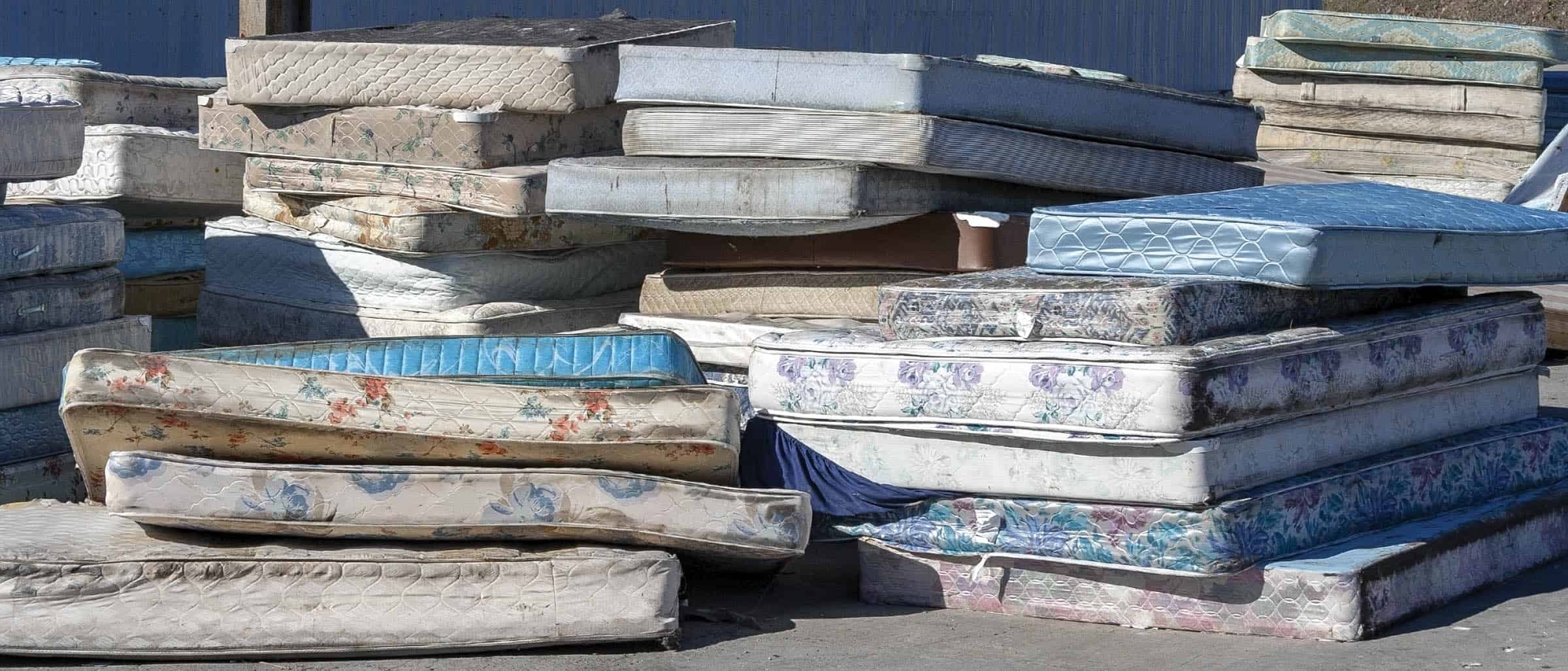Bedding producer is the first to complete the new process
to help companies make their plants more efficient

Independent bedding maker Pleasant Mattress has become the first manufacturer to achieve certification for its production facilities through the Mattress Recycling Council’s Sleep Products Sustainability Program.
The program, SP2 for short, helps mattress manufacturers in California reduce waste, save money and make their facilities more efficient. It launched in 2019 and is available at no cost to bedding producers or those that sell in California.
“SP2 helped us look at our business from a different perspective — from recycling to the materials going into landfills to energy consumption and beyond,” says Rion Morgenstern, chief executive officer of Pleasant Mattress, which has headquarters and two adjacent manufacturing facilities in Fresno, California. “It caused us to ask ourselves how we could do more for the environment in many ways. That is the power the SP2 program has. It helps with awareness and education and provides a suite of tools for participants to focus on reducing waste in all areas while generating operational efficiencies. As a result, we have strengthened our ‘sustainability DNA’ and our management practices, systems and processes to forge new behaviors.”
SP2 is an environmental certification program for manufacturing plants, including their support facilities. The program has seven other facilities registered and in various stages of the certification process, says Ryan McMullan, SP2 consultant and principal consultant with Lean Green Way in Long Beach, California. (See profile of McMullan on page 50.)

SP2 is attractive to mattress manufacturers because it is a third-party certification, which lends credibility, and because it is customized, practical and actionable — companies make real, measurable changes through the program. “It’s not just a paper exercise,” McMullan says.
Deadlines: No. Momentum: Yes
Interested companies can register through MattressRecyclingCouncil.org/SP2. An initial step for participating facilities is to create an SP2 team, typically a small group of managers and employees across different departments and functions. McMullan conducts the SP2 training, either in-person or virtually over a few days, and provides the company’s internal SP2 team with the guidelines, templates and other documents they need to assess their current operations and to implement, measure and track improvements.
Once a facility has met the 11 SP2 requirements (see box at left), it can request formal certification, which includes a visit to the facility and a document review by MRC’s certification team. There are no deadlines to complete the requirements or timetable for earning the certification, McMullan says.
“It’s on their schedule and it’s their choice how hard they want to push,” he says, “but we do recommend they try to keep up momentum.” Making progress to reduce waste, streamline production and save money is a powerful motivator, McMullan says.
Pleasant Mattress President Carter Gronbach led the SP2 process for the company, building on his experience in lean manufacturing to “reduce environmental and productivity inefficiencies while delivering what our customers expect from us,” Morgenstern says. “The entire team has a sincere interest in reducing any negative impact the mattress manufacturing process has on the environment. We had all levels of employees involved in determining what we could do better during each process to reduce our carbon footprint. From the leadership all the way down to the janitorial staff, everyone understands the need for waste reduction and the value of eco-friendly initiatives and wants to integrate them into our daily practices.”
Passion + process
Rather than making one-off attempts at improving their sustainability, SP2 encourages companies to make improvements systematically. By looking at waste — whether that be energy waste, water waste or materials waste — throughout a facility and across functions and departments, companies are able to make significant, long-lasting changes, he says.
“There’s no substitute for passion, but passion itself isn’t enough to sustain improvements,” McMullan says. “You have to have processes in place going forward.”
Pleasant Mattress definitely had the passion, Morgenstern says. “(We have) a strong, environmentally focused culture,” he says. “As a team, we are committed to improving the environment, society and the economy by taking positive steps to improve the impact our business has on consumers, our community and our employees.”
And SP2 helped give the company structures and procedures it needed to advance its efforts. “We have always worked to integrate sustainability efforts into our business practices, including reducing waste and assuring that our waste goes into appropriate recycling channels,” Morgenstern says. “However, SP2 gave us a methodology and a framework to take our efforts to the next level.”
As part of the certification process, MRC will check back in with Pleasant Mattress on the first and second anniversaries of its certification to verify that the bedding producer is continuing its sustainability efforts, including making any additional improvements that Pleasant Mattress chooses to undertake. In the third year, MRC will do a comprehensive on-site visit to recertify the facilities.
Going forward, one area of continuous improvement for Pleasant Mattress will be reducing the amount of plastic used to package components and materials received from suppliers, as well as plastic used to package its own products, Morgenstern says.
“For example, we are buying our foam in bulk, which doesn’t require any packaging, and cutting it ourselves instead of buying it in pieces that are delivered in individual plastic wrap. Also, Carter is looking at ways to reduce human energy waste. It takes a lot of energy to make a mattress, so we are looking at different layouts for the factory floor to reduce the steps it takes to move a mattress from one process to the next. This will make the workflow more efficient for our employees, so they are safer and healthier at the end of the day,” he says. “We are also purchasing slightly narrower rolls of sheeting for packaging box springs to eliminate excess waste. While it only saves an inch or two per unit, when making 100,000 units per year, it eliminates a substantial amount of the packaging.”
Earning SP2 certification has reinforced Pleasant Mattress’ commitment to environmental sustainability — at the personal and corporate levels, Morgenstern says.
“While it’s true that sustainability is a competitive advantage in terms of reducing waste, reduced energy costs and employee retention, it is also true that sustainability connects our organizational values to our employees’ personal values, particularly regarding protecting the natural environment,” he says. “Our sustainability practices are connected to our people practices and our entire company feels proud to have achieved this distinction.”
To Get Started
To learn more about the Sleep Products Sustainability Program, or SP2, visit MattressRecyclingCouncil.org/SP2, where you’ll find an information sheet, a short video overview, an FAQ webinar and more. Sign up to participate or to get additional details. You also can call 855-229-1691.

What’s Required?
Plan
• Environment
• Facility impact ssessment
• Goals and Targets
• Measurement of progress
People
• Employee awareness and
engagement
• Supplier partnerships
• Best practice sharing
Process
• Regulatory compliance
• Program verification
• Corrective and preventive
actions
• Program resilience
Mattress Recycling Successes Pile Up

Through its programs, the Mattress Recycling Council recycles more than 1.7 million mattresses a year. MRC operates in three states that have mandated industry-led statewide mattress recycling programs. Here are state-by-state highlights of their overall impact and most recent accomplishments.
California
Five years of consistent growth and expansion have led to the recycling of more than 7 million mattresses in the Golden State. According to the most recent performance data for MRC’s program, more than 1.5 million mattresses were recycled in 2020, which diverted 32,400 tons of materials from landfills.
The program’s recyclers achieved a 77.1% recycling rate — the highest in the program’s history and an improvement of more than 6 percentage points from the previous year.
MRC has been focused on expanding access to mattress recycling in rural and other underserviced areas by adding collection sites and bulky item collection programs. Overall, 98.6% of Californians had access to MRC’s no-cost collection sites or events in 2020, up from 94.8% in 2019. Additionally, mattress retailers provide no-cost take back of an old mattress to any consumer who has a new mattress delivered anywhere in the state.
Connecticut
Since its start six years ago, MRC’s program in Connecticut has recycled more than 1 million mattresses, diverting more than 18,000 tons of steel, foam, fibers and wood from landfills and incineration. In 2020, MRC increased the number of mattresses collected in Connecticut to 213,540, up 12% over 2019, and recycled 3,813 tons of materials.
Rhode Island
During the past five years, MRC’s program in Rhode Island has recycled more than 500,000 mattresses, diverting more than 8,000 tons of steel, foam, fibers and wood from the state’s central landfill.
Since its 2016 launch in the state, MRC has recruited municipal transfer stations, waste haulers, nonprofit organizations, mattress retailers, hotels, universities and hospitals to divert their discarded mattresses for recycling. Currently, 37 Rhode Island municipalities and more than 200 Rhode Island-based public and private entities participate in the program.
For more information
To learn more about the MRC’s efforts to increase mattress recycling, visit Mattress-RecyclingCouncil.org. Check the Program States section to read the most recent annual reports for these three states.
In early 2022, BedTimes will look at sustainability across the mattress industry, with updates about MRC’s research into improving recycling efficiencies and creating new and better markets for used mattress components.
“My Focus Is on Strategic Sustainability”
SP2 consultant says helping to make mattress plants more efficient has broader benefits for the environment

In his spare time, Ryan McMullan likes not only to play games with his adolescent son but to design them, too. Computer games, board games, role-playing games — the two have collaborated on all types. Their latest is the Zero Waste Board Game — a clear sign that McMullan’s passion for sustainability extends to all parts of his life.
In the game, players strive to make a production facility more efficient.
“There are no right or wrong answers in the game. But the choices you make in Round 1 set you up for Round 2 and so on, and players can see how various sustainability efforts work together. Some players try to maximize cost savings; some try to maximize their 3R (reduce, reuse, recycle) rate. The goal of the game is to move in the right direction, and we give players lots of ways to do it,” says McMullan, principal consultant with Lean Green Way in Long Beach, California, and also consultant for the Mattress Recycling Council’s Sleep Products Sustainability Program, known as SP2. The game made its public debut at Greenbuild, the global LEED conference and has been used in trainings, workshops and webinars since then. (LEED is a green building certification managed by the U.S. Green Building Council.)
“In Monopoly, you’re not managing a real-life real estate empire — the game distills down the concepts to a series of framed decisions that make it fun,” McMullan says.
The Zero Waste Board Game does the same thing for the complex world of sustainability. By doing so, it exemplifies McMullan’s approach to helping companies reduce their environmental footprint by framing understandable possibilities and choices for executives so they can make the best decisions.
“My focus is on strategic sustainability — looking at long-term trends and targets, and helping organizations navigate toward a sustainable future in a way that’s pragmatic and that improves overall production,” he says.
Starting early
When choosing a career path, McMullan knew he wanted to focus on environmental protection, but not through academia or law. He envisioned a more practical approach. He earned a bachelor’s degree in ecology and cognitive science from Rice University in Houston and, after graduation, went to work as recycling coordinator for the school, a job that expanded to include other sustainability initiatives. “We did their first greenhouse gas inventory, which was a relatively new idea at the time,” he says.
Seeing how organizations could make systemic changes to improve the environment, McMullan went on to earn a master’s degree in environmental science and management from the University of California, Santa Barbara. He spent nearly 14 years at Toyota, first as environmental programs administrator and then as manager of sustainability, environmental, and safety. He also helped write the standards for TRUE, a zero waste certification for facilities.
Through Lean Green Way, McMullan aids companies in making real, practical shifts in their operations to improve efficiencies and reduce waste of all types through assessments, strategic planning, target setting, training and reporting.
The name of his firm is a nod to the lean manufacturing methods pioneered by Toyota. Its clients include Lockheed Martin, Walmart and CyrusOne data centers, but McMullan works with companies of all sizes.
“One of the things I bring to companies is the ability to listen hard and learn fast. I understand that every facility and every company culture is different,” he says. “I don’t say that one size fits all or that there’s one true way,” he says. “I learn the way companies operate, the terminology they use, the culture they’ve built, and I help them build sustainability into their existing culture.”
Back to nature
McMullan’s passion for the environment started young when his grandparents took him on long road trips. “We visited every national park in the West,” he says, explaining that his grandfather supplemented the many park ranger talks they attended with his own knowledge of natural history.
He still enjoys the outdoors, gardening and exploring natural areas. He visited California’s Big Bear area on a recent vacation.
“Because I’m so entrenched in this field, I see the misery and impact that’s caused by environmental challenges. If you pay attention, it can be wearing, and a lot of people get stopped by despair,” he says. “But then I see an organization making big changes, doing it smartly and having a big impact. If I can be there to guide an organization to take a change that has a 10-fold impact and show them how to make it have a 100-fold impact, there’s a lot of good I can do.” •




